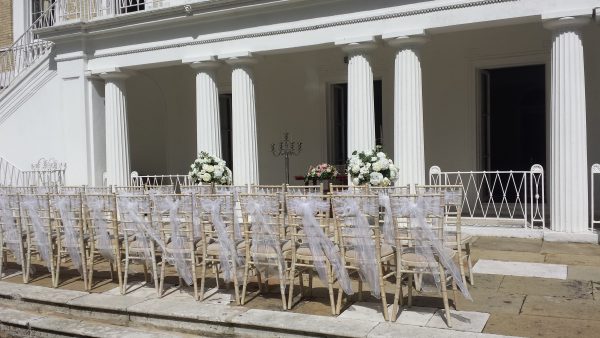
by Michael | May 27, 2024 | Blog
Almost by definition, weddings don’t come cheap! Indeed, for a wedding guest alone (in the UK), average spend is currently several hundred pounds. Don’t ask what it may cost to arrange a wedding!
One reason for the high expense rate is that you are likely to need a lot of suppliers. And all need to be paid.
Some undervalue themselves or feel the pressure of competition and lower their rates, so bargains can occasionally be had; many are reasonable enough; but others seem to take advantage of you!
Bear in mind that not everybody is able to do their work as well as them. They should have been trained, and possess particular skills and ability.
Obviously, clients have different perspectives and aims. No two weddings are the quite same. You may value what the suppliers offer in a different way to the next couple.
So it’s a good idea to do your homework carefully, and compare like with like.
The kind of suppliers you’re likely to want may include the following: a venue, wedding planner, florist, photographer, celebrant, caterer, make up artist, dress/suit hire.
You can go down the DIY route – arranging everything yourself – but there are inherent dangers in relying on amateurs and it can be very stressful in the final reckoning.
May I advise you to look for a celebrant? They can add an extra dimension to your event. What skills must they possess?
They need to be able to find out what your vision really is for the day. Can they listen well, not just imposing their own choices, although advice can often be invaluable)? They must be good writers when putting together the ceremony and, not least, be able to present well.
As regards myself, I hold a Diploma in Wedding Celebrancy and have over 11 years’ experience in conducting ceremonies. I am calm, friendly and professional. I belong to a respected professional association.
I feel justified in charging for my services (I’m probably mid-range).
Other suppliers will be experts in their fields too, so will be justified in charging what they do.
Your job is to weed out the one(s) you feel will chime best with your wants and whom you can trust. Obviously, don’t sign up with anyone until you have understood their Ts & Cs.
Once you have a suitable supplier on board, you won’t regret the outlay. And remember, you’re also paying for peace of mind, and how easy is that to put a price on!
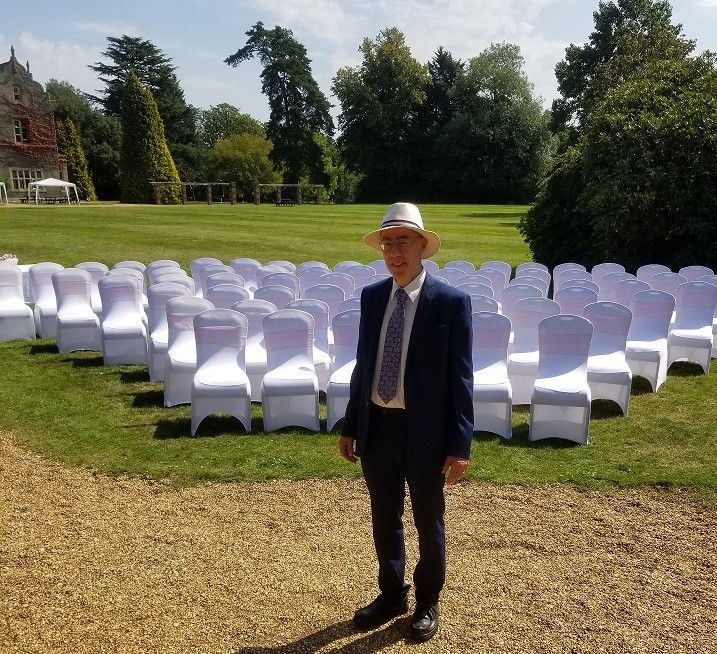
by Michael | May 21, 2024 | Blog
I graduated more years ago than I care to remember. In fact, I’ve reached the age when it’s difficult to remember anything! Joking apart, I studied French and Russian (with Czech) at the University of Leeds in the 1970s.
I knew I had an aptitude for languages, and studied German informally (in my free time). I eventually obtained an A grade at A level German, so my studies weren’t really that informal!
I finished with a IIi degree in Modern Languages, and no idea what to do with it. I did know that I didn’t want to teach, but that was it.
A connection of my father set me up in the shipping department of a textile company, where I lasted a year and a half. I wasn’t cut out for the job, but wasn’t given much guidance, in truth.
By then, I had been teaching (yes, I know) adults in an evening class. Business French was the subject – not a facet of French that I was particularly familiar with. So I had to be a step ahead of the class every week, but I got through it and even enjoyed it.
So I applied for posts in full-time teaching and eventually was invited for interview at an independent secondary boarding school in a beautiful Kent village. I almost missed my train that day and then the connecting bus, but somehow managed to arrive at the school and was offered the post.
I had to do a lot of learning myself (as I was untrained, of course), but, after six years I moved on, and my teaching career took off.
Eventually, after 25 years, I moved on, having lost my mojo. I went into natural health and wellness products, which I pursued for many years (until 2023, in fact). It was not a financial success, but enjoyable, valuable for personal development and proved beneficial to many people.
In 2013 I discovered celebrancy, and, after training, have pursued a successful and meaningful career in this area, which I love.
Languages stood me in good stead as a teacher (and when travelling), but I did not expect them to be of much use on my celebrancy path.
However, as it happens, I have performed several ceremonies (including a wedding and funerals) in Russian, a Vow Renewal in French, a couple of weddings in Hebrew, and part of a wedding in Swedish (which I don’t actually speak!). I never thought it would be so useful being a linguist!
I’m still waiting for an invitation to conduct a ceremony (or part of one) in German, or, indeed in Italian or Czech (both of which I can get by in). Maybe you can send me somebody who needs a multilingual ceremony?
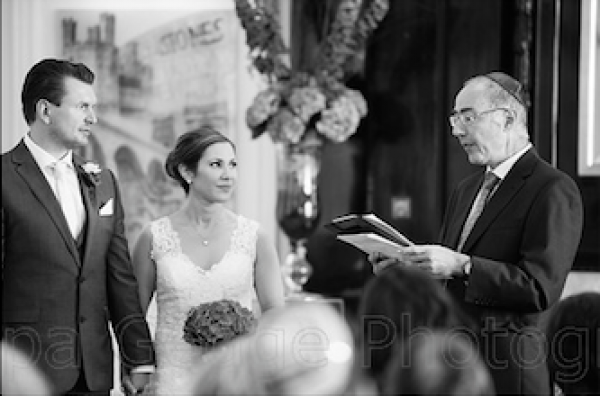
by Michael | May 6, 2024 | Blog
Of course a mixed-faith ceremony frequently is beautiful, inspiring and enjoyable.
However, such a result doesn’t just happen; it has to be worked at.
That means, not only seeking harmony among your family but also putting together the right service.
Finding a happy medium can certainly be challenging, but doesn’t need to be so.
A lot of common sense and willingness to compromise can go a long way.
If only one partner is religious, then it should be reasonable to look for a ceremony that contains the most important religious sections, but which is not too heavy.
If both partners want their own religion included, again it should be possible to come to an amicable agreement how much of each religion would be desirable.
I have conducted numerous ceremonies where the amount and subject-matter of the religious elements has been tailor-made for the couple (and/or their families). It can be done.
Incidentally, it seems to be the case that the side wanting religion (as opposed to the atheist) is more vociferous. Make of that what you will!
Most of my mixed-faith ceremonies have been for Christian and Jew. We have used certain elements of each religion, with explanations where necessary. So particular prayers or rituals have featured.
In most cases, the service has been mostly spiritual, with just a small part religious. Sometimes we use the Loving Cup ceremony and/or we might have the groom treading a glass underfoot. Other rituals are available. There can be pagan elements too, of course.
To help sort out all these choices, be prepared to co-operate with all concerned. Be reasonable and listen to their viewpoint, but remember it is YOUR ceremony.
And, most importantly, have a chat with your civil celebrant. They can help with ideas and guidance.
It doesn’t have to be a minefield.
I am waiting for your call!
photo: Phillipa Gedge
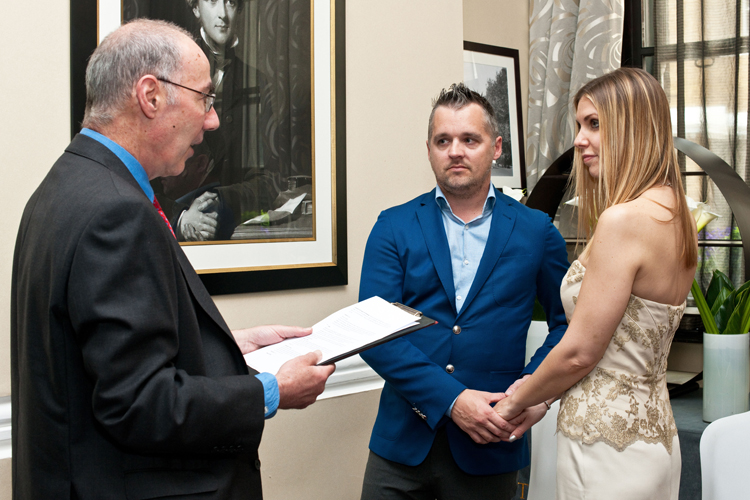
by Michael | Apr 30, 2024 | Blog
I’ve been a Civil Celebrant for some 11 years now.
Up until about 2009 I don’t think I had even heard of the profession, far less knew what a civil celebrant actually did.
So it doesn’t surprise me that there are a lot of people out there for whom the job of civil celebrant is a mystery.
Perhaps I may clarify a few things?
What I am Not
One area of confusion is that there are various types of celebrant out there.
Some offer a totally religious take; others, like the Humanists, do not. A Humanist is supposed to conduct a completely secular service, without even a mention of God.
An independent civil celebrant like myself can lead a fully secular service too, but is also able to offer a part-religious or mixed-faith service (or even a full religious one).
Your Venue and the Timing
Although the law was supposed to have changed by last July, it still stands that a legal ceremony must take place at a Register Office or at a place licensed for weddings.
In both instances, you cannot necessarily marry any day or time you choose.
The advantage of a civil celebrant ceremony is that there are no restrictions to constrain your choices. Indoors, outdoors, in a hotel, on the beach, weekday evenings, Sundays – you name it, the celebrant can accommodate you.
What’s in the Ceremony?
The celebrant-led ceremony may be a great many things.
It can be religious and quite conventional. It may be quite woo-woo, with pagan rituals, for example. It can be a combination. To decide on the sort of ceremony – and its tone and content – have a chat with your celebrant and get a few ideas (or explain your own).
This preliminary chat is invaluable as you can discuss the elements to include and also who (if anyone) is going to participate and how. You also get to know the celebrant a bit. That way, you can ask questions and check that you will be happy working with them.
So now a little of the mystery has been unveiled, I trust! You can see how the celebrant-led ceremony will ensure that you have the unique, personalised ceremony of your dreams.
If you want to discuss this further, please get in contact with me.
Photo: Victor Shack
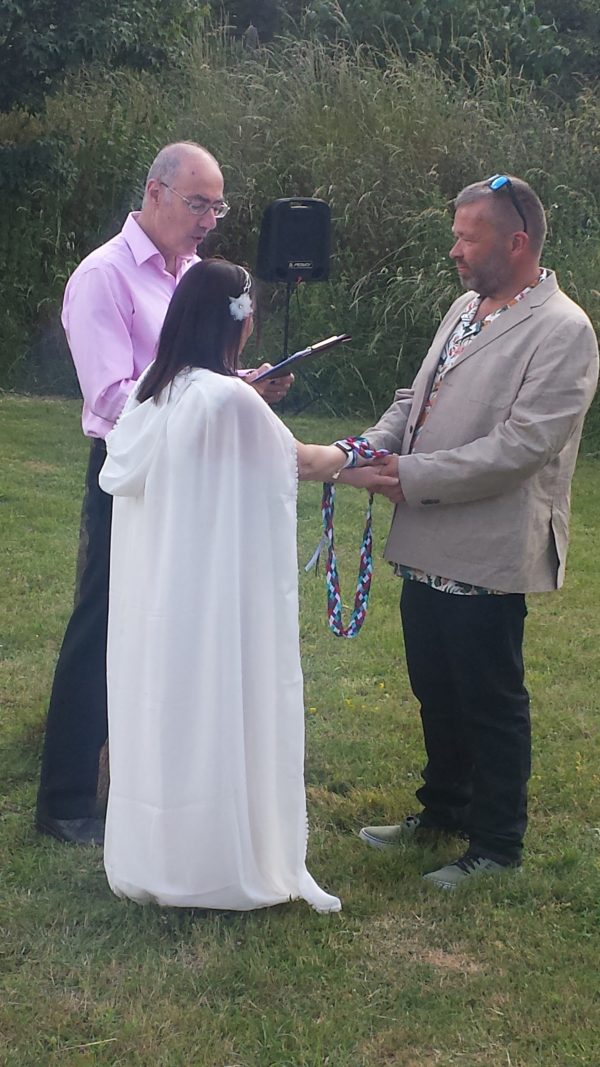
by Michael | Apr 23, 2024 | Blog
Quite a lot of people seem to have heard of the term “handfasting”, but considerably fewer know what it is.
Enlightenment is on its way!
History
Handfasting originated in pagan times, and it gained force in medieval days.
It was a way for peasants – mostly – to afford a wedding. Clergymen would usually prove too costly to hire, so an alternative was offered.
A cord could be wrapped round the couple’s wrists until their union was consummated.
They would keep the cord afterwards as a token of their love and commitment.
Up-to-date versions
In modern times, the symbolism has remained, although there are essentially two kinds of handfasting nowadays.
One kind is where the handfasting is a small (but significant) part of a larger ceremony. The other makes it one of the most important elements of the entire service.
There is a whole variety of options how you can be bound together, Cord or ribbon, usually at least 1 metre long, is commonly used. It may have several “heads” and colours. Personal preference is fine, but there are also certain colours considered more auspicious that others. You can also have the choice how the cord/ribbon is tied.
Personally, I prefer the (eternity) figure of eight.
A Full Service
Again, there is fluidity and choice as to how to put together a full service, have a chat with your celebrant beforehand. However, the following components are usual:
Sanctifying the Circle
The circle symbolises the womb of Mother Earth and the idea is to make the ceremony site a holy place. The celebrant will make a circuit, offering prayers.
Elemental Blessings
Again some legwork for the celebrant! Blessings are offered in the four principal directions – enabling us to appreciate how the four elements help us on our journey.
Loving Cup
The couple may use their favourite drink quaffed from a loving cup (or “quaich”). The rationale for this is that we drink in the promises or vows we have made.
The Handfasting
This is the symbolic binding of the hands. We get the terms “tying the knot” and “bonds of holy matrimony” from this. This actual rite may only last a minute.
Jumping the Broom
This custom, though colourful and potentially amusing, may well be a throwback to American slave weddings. Therefore, not everyone approves of it.
It symbolises the creation of a new home together.
What’s the Point of a Handfasting?
The act of handfasting and the words that accompany it can be very beautiful. Moreover, the ritual stands out by its uniqueness and also the interplay and visible reactions of the couple.
The connection to nature is also highly significant.
To discuss handfastings further, feel free to give me a call.
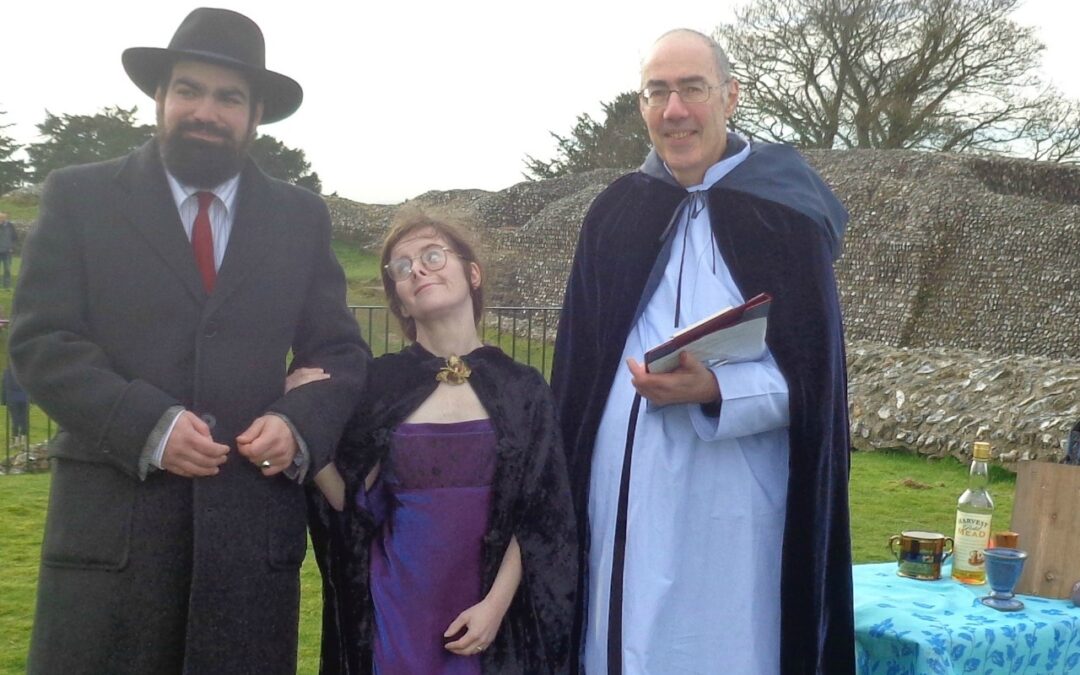
by Michael | Apr 9, 2024 | Blog
It’s normal enough to feel the worse for nerves on your wedding day. Or on any big occasion.
It’s not a bad thing in moderation. In fact, a bit of adrenaline doesn’t hurt at all.
However, you don’t want wedding day nerves that spoil your day. Or even the run-up.
So, what can you do, if you think you’ll be likely to suffer with too many butterflies?
There are tricks you can employ and/or you can accept help.
Techniques
One of the most reassuring things is knowing you are surrounded by trusted professionals. This applies, no matter how many professionals you employ. By that I mean planners, photographers, celebrants, florists, make-up artists, caterers, musicians, etc. etc.
If you have chosen these professionals with care, you know you can rely on them. They will provide a good service and won’t let you down, if something actually does go wrong.
But you can help yourself too.
Firstly, if you have prepared properly for your event (using experienced professionals), let go of the fear and worry. You’ve done all you can to prepare; now it’s down to others to do their job. There’s no point going over in your head what could go wrong. In truth, anything can happen – but it probably won’t! So don’t go looking for trouble, when there probably won’t be any.
If the worst comes to the worst, and something does go wrong, people are usually forgiving, especially if you’ve obviously tried your best.
If the thought of being in the public eye is too much for you, there are people that can help with phobias. I am particularly thinking of Isobel. Her website is www.intherighthands.co.uk, and she has helped a lot of people significantly. She’ll be happy to talk with you.
Remember, come what may, that the vast majority – if not all – of the people at your wedding will be batting for you. Just go out there and enjoy your day!
Feel free to discuss any points this may have raised.






